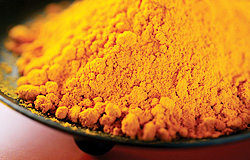Dr. Weeks’ Comment: I weary of uninformed oncologists blithely repeating to unsuspecting patients simply what they were taught, rather than reading and thinking for themselves about how to optimize patients care. Such is the power of the standard of care that even when remedies which are obviously superior and less toxic are available, conventional doctors refuse to inform patients of those options.We hear all the time variations on this refrain: “Don’t take anti-oxidants when you are taking my chemotherapy because it will blunt the “beneficial” effects of the toxic chemotherapy (oxymoronic?).” When in fact there is NO science supporting that urban myth and all the studies of the interactions of anti-oxidants on the outcomes of patients taking them concurrent with chemotherapy demonstrate unambiguous benefit! Here we see cur cumin’s role coincident with chemotherapy: like the most amazing invention of man (the thermos: “keeps hot things hot and cold things cold – how does it know?”), so too the amazing human body demonstrates that it can wisely use the antioxidants to protect itself while not allowing them to protect cancer cells or interfere in any manner with the cytotoxic effects of chemotherapy drugs. Read on: the term “chemosensitizing” means helps chemotherapy work better. Many nutritional supplements are helpful in the is manner! Teach your oncologist!

Curcumin sensitizes colon cancer cells to chemotherapy
The current study utilized cultures of two high density colorectal cell lines that were sensitive to 5-fluorouracil and cultures of their 5-FU resistant clones. One of the two non-resistant lines and its resistant clone were deficient in their DNA mismatch repair (MMR) systems, which results in genetic instability, increased susceptibility to neoplastic transformation and greater development of chemoresistant cells. Cells were treated with varying concentrations of 5-FU or BCM-95 curcumin, or received pretreatment with curcumin followed by exposure to one of four concentrations of 5-FU.
An article published last year in the journal PLOS One reports the finding of Mehdi Shakibaei of Ludwig Maximilian University in Munich, Germany and colleagues of a chemosensitizing benefit for curcumin, a compound occurring in turmeric, in colon cancer cells resistant to treatment with the chemotherapy drug 5-fluorouracil (5-FU). Resistance to 5-FU occurs in as many as 15% of colorectal cancer patients, and the rate of recurrence is estimated to be as great as 50% to 60%, due in part to cancer stem cell survival.
While 5-FU dose-dependently reduced the proliferation of the non-resistant cell lines, curcumin alone decreased proliferation in all cell lines, showing the most significant effects in the lines that were not MMR-deficient. Pretreatment with curcumin four hours prior to 5-FU administration revealed a benefit in 5-FU sensitive as well as resistant cells after 24 hours. Either treatment or their combination also decreased markers of cancer stem cells in all lines, with the greatest benefit observed in association with combination therapy.
“Our results demonstrate that with curcumin the proliferation of MMR-deficient and proficient colorectal cancer cells as well as their corresponding 5-FU resistant derivatives was suppressed and the effect of 5-FU was potentiated in a dose-dependent manner, thereby reducing the proliferation of colorectal cancer cells significantly,” the authors write. “We demonstrate that curcumin potentiated the antitumor effects of 5-FU in the parental as well as the 5-FU resistant derivatives of these cells in a three dimensional high density environment resembling the in vivo situation.”
“In this report, we provide novel evidence and previously unrecognized effects of curcumin, showing that curcumin individually or in combination with the conventional colon cancer chemotherapeutic agent 5-FU could serve as an effective therapeutic strategy to prevent the emergence of chemoresistant colon cancer cells by reducing cancer stem cells,” they conclude. “Our data suggest that a combination treatment of phytochemicals together with conventional chemotherapeutic agents can be very beneficial for the patients in enhancing the clinical therapy and simultaneously reducing side effects through lower dosage requirements.”

